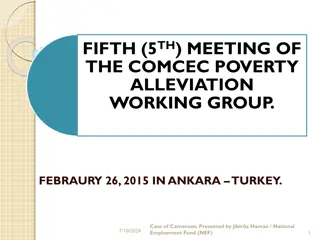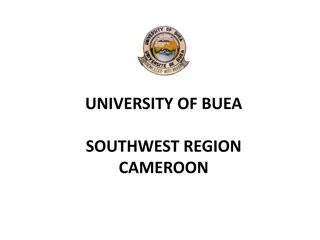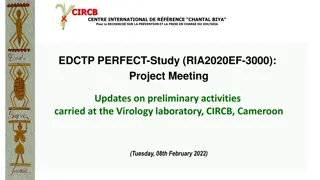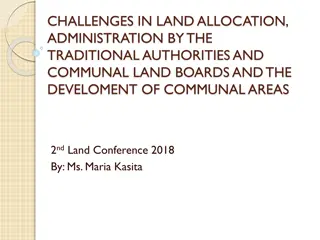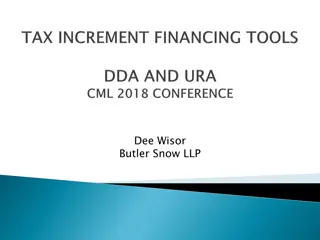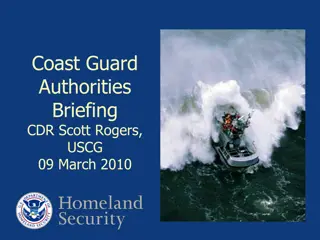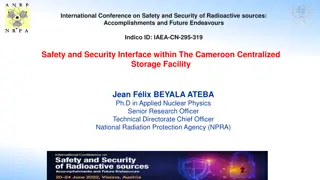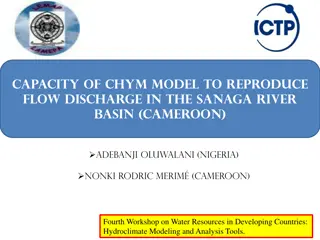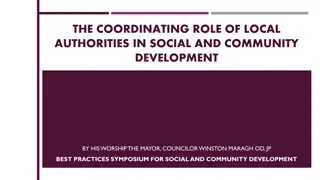Enhancing Human Resources Management in Cameroon's Local Authorities
Managing human resources effectively is crucial for the success of local authorities in Cameroon. The capacity-building seminar aimed to improve skills in administrative, financial, and human resources management for local players. The seminar addressed issues such as career development, HR management tools, and the current state of HR in regional and local authorities. The census conducted in 2019 revealed significant shortcomings in HR management, emphasizing the need for improvements in the decentralized system.
Download Presentation

Please find below an Image/Link to download the presentation.
The content on the website is provided AS IS for your information and personal use only. It may not be sold, licensed, or shared on other websites without obtaining consent from the author. Download presentation by click this link. If you encounter any issues during the download, it is possible that the publisher has removed the file from their server.
E N D
Presentation Transcript
CAPACITY BUILDING SEMINAR OF SOME LOCAL PLAYERS IN ADMINISTRATIVE, FINANCIAL AND HUMAN RESOURCES MANAGEMENT IN CAMEROON DECENTRALIZATION AOUT 2020 AOUT 2020
THEME : Managing Human Resources in Regional and Local Authorities By CHO NGU Ernest, DRH-CTD AOUT 2020 AOUT 2020
INTRODUCTION I - Procedures for managing council staff in RLAs A - Career development of council staff B - Implications of the contract binding the worker to the council II - The new RLA HR management tools A - From CEFAM to NASLA B - Towards a Local Public Service CONCLUSION AOUT 2020 AOUT 2020
INTRODUCTION AOUT 2020 AOUT 2020
Human resources are a set of people whose skills are used to achieve an organization's objectives. Their management is therefore seen as practices implemented to administer, mobilize and develop them with a view to the optimum functioning of the administration to which they belong. Indeed, human resources management is split into many tasks including job definition, recruitment, career management, training, payroll and compensation management, performance assessment and motivation. Human resources management is a major concern for those involved in decentralization. This is why, during the General Conference of Local Councils, held on 6 and 7 February 2019, one of the strong recommendations made concerned improving its efficiency. To this end, it is important to draw up an inventory of RLAs HR, which in the current state are mainly composed of staff recruited by council decision and council employees, recruited on the basis of a contract binding them to the council in which they serve. In addition to these two types of staff, there are civil servants and contract officers seconded to regional and local authorities. AOUT 2020 AOUT 2020
A census mission of council and city council staff of Cameroon regions was carried out by MINDDEVEL in 2019. Exploiting the partial count gave rise to the following figures: DISTRIBUTION OF IDENTIFIED STAFF 9000 - - - - - - 56 civil servants; 104 contract employees; 2,817 council officers; 8,176 decision workers; 3,969 temporary workers; 10 seasonal workers. 8000 8,176 7000 6000 5000 4000 Series1 3,969 3000 2,817 2000 1000 56 104 10 0 fonctionnaires contractuels d administration contractuels communaux d cisionnaires ; temporaires saisonniers AOUT 2020 AOUT 2020
Lessons from this census operation revealed many shortcomings in the HRM of Cameroon's RLAs, including: - low qualifications of recruited staff; - over-recruitment of decision/temporary/seasonal staff with no known qualifications; - disregard for ethical and moral rules and requirements in HR governance; - absence of a training and capacity building plan; - systematic failure to hold sessions of Joint Promotion and Reclassification Committees; - lack of clarity in the objectives and criteria for recruitment, promotion and sanctioning of staff. - non-repayment of social insurance contributions. AOUT 2020 AOUT 2020
The legal framework applicable to human resources, on the other hand, is varied and made up of a number of instruments, which are, inter alia: - Law No. 1992/07 of 14 August 1992 to institute the Labour Code; - Law No. 2019/24 of 24 December 2019 to institute the General Code of RLAs; - Decree No. 2018/449 of 1 August 2018 to organize the Ministry of Decentralization and Local Development; - Decree No. 78/484 of 9 November 1978 to lay down the common conditions applicable to State employees governed by the Labour Code, as amended by Decree No. 82/100 of 3 March 1982; - Decree No. 94/199 of 7 October 1994 to lay down the General Rules and Regulations of the public service of the State, as amended and supplemented by Decree No. 2000/287 of 12 October 2000; - Order No. 136/A/MINATD/DCTD of 24 August 2009 to legally enforce the standard list of council jobs. AOUT 2020 AOUT 2020
This presentation will highlight procedures of HR management in RLAs (I) by dwelling on the link that could be made between them and the performance of council administration, by equipping participants as much as possible with information from various instrumentsin the area of HR management, and presenting the various procedures that help optimize the management of RLA human resources. This will be followed by a projection of the new RLA (II) HR management tools, with a focus on the new framework under RLA HR Management, as well as expectations for the future local public service and NASLA. AOUT 2020 AOUT 2020
I - PROCEDURES FOR MANAGING COUNCIL STAFF IN RLAs AOUT 2020 AOUT 2020
A - Career development of council staff It is the set of administrative situations in which council staff find themselves, from their recruitment to the cessation of their activity. This includes advancement, reclassification, training and end of their career. 1. Recruitment Recruitment of staff in RLAs shall be subject to the following conditions: - budget availability; - council deliberation - job description - defining candidates profile; - notification (decision, contract). In addition, the Mayor, competent for recruitment pursuant to Sections 209 and 210 of the General Code of RLAs, ensures compliance with the ratios prescribed by Section 417 of the Code. Strict compliance with a pre-established recruitment plan on the basis of identified needs could contribute to greater efficiency in the recruitment of council staff. On a completely different plane, Order No.136/A/MINATD/DCTD of 24 August 2009 to legally enforce the standard list of council jobs states that council staff are recruited either by decision from the 1st to the 6th category, or by contract from the 7th category upwards. AOUT 2020 AOUT 2020
As far as recruitment by decision is concerned, it follows the following steps: - Council deliberation empowering the Mayor to recruit; - draft council recruitment decision; - submission to the Finance Controller and the Labour Inspector for approval; - submission of the Council decision for approval by the relevant Senior Divisional Officer after authentication of the documents provided; - Approval of decision. AOUT 2020 AOUT 2020
Recruitment by contract is based on the following steps: - Council deliberation empowering the Mayor to recruit; - authorization request from the Mayor to the Minister in charge of local authorities (presenting the council ratio, an approved council organization chart, and a staff statement for the current year); - preparing the draft contract; - endorsements of the labour inspector and the finance controller, then approval by the Senior Divisional Officer; - transmittal of the draft contract to the Ministry in charge of RLAs for validation; - crosscheck and authentication of diplomas by the relevant services; - validation by the Minister in charge of local authorities leading to an employment contract. AOUT 2020 AOUT 2020
In addition to these two main means of recruitment, state personnel may be appointed or made available to a RLA. This is known as secondment. It is defined according to Article 70 (1) of the General Public Service Regulations as the position of a civil servant placed temporarily away from his duty post to serve with a public establishment, local public authorities or companies, public or semi-public entities, national private companies, private entities of general interest or of an associative nature carrying out missions in the public interest, international organizations or non-governmental organizations. Secondment is not to be confused with placement at disposal, which can be legally defined as an assignment that concerns State employees governed by the Labour Code. Indeed, civil servants and other public servants may be transferred, seconded or put at the disposal of regional and local authorities, at their request, by the relevant minister. In this case, the request is addressed to the minister concerned, under the cover of the representative of the State who gives his opinion. AOUT 2020 AOUT 2020
2. Advancements It is governed by Articles 17 and 18 of Decree No. 78/484 of 9 November 1978 to lay down common provisions applicable to State employees governed by the Labour Code, as amended and supplemented by Decree No. 82/100 of 3 March 1982, which states that permanent employees receive an annual mark awarded by the chief executive based on the level of satisfaction with their service. A mark above 12/20 entitles the staff member to move up to a higher level every two years; this increment is sanctioned by a decision of the Joint Committee on Promotion and Reclassification. The Joint Committee on Promotion and Reclassification comprises as follows: - - - - - - The relevant Senior Divisional Officer; The Mayor of the council concerned; The relevant Delegate of Labour and Social Security; The Finance Controller; Staff Representatives; The Council Treasurer. AOUT 2020 AOUT 2020
Advancement obey the following steps: - request for advancement; - examination by the Joint Committee on Promotion and Reclassification, which is sanctioned by minutes; - draft decision by the chief executive; - approval by the Senior Divisional Officer. Councils encounter some problems in the day-to-day management of advancements, namely the irregularity of their financial assumption due to the cash-flow problems encountered by the latter. AOUT 2020 AOUT 2020
3. Reclassification. It is governed by Decree No. 78/484 of 9 November 1978 to lay down common provisions applicable to State employees governed by the Labour Code, as amended and supplemented by Decree No. 82/100 of 3 March 1982. Decided by the joint committee, it is the act of registering a staff member in a higher category or at a higher level following a degree, diploma or certificate award not taken into account on recruitment and obtained thereafter. It also depends on the assessment of his superiors. For each category of staff, reclassification follows the same steps as recruitment after approval by the Joint Committee on Promotion and Reclassification. AOUT 2020 AOUT 2020
Here, the main problem is that sessions of the Joint Committee on Promotion and Reclassification are not held regularly. It should therefore be recalled that, as far as reclassification is concerned, qualifications obtained and those to be reclassified must be related to the duty post occupied. An authorization to take a competitive exam is also required, as well as a training plan issued by the Authority. On this subject, it should be noted that Mayors should ensure that sessions of the Joint Committee on the Promotion and Reclassification of their council are held regularly for systematic advancement and/or reclassification of council staff who should benefit from it. AOUT 2020 AOUT 2020
4. Training Each local authority should put in place a training plan to build the capacity of its staff, based on the expectations of citizens and on current or future projects. This plan could be a multi-year plan that could be revised each year. The development of a training plan includes 4 (four) main steps: the collection of training needs, their analysis, defining training priorities and drafting the plan. This plan will enable the establishment, where appropriate, of specifications for the training identified. Each local authority should therefore set aside a specific budget for training. AOUT 2020 AOUT 2020
For the operationalization of its training plan, the council could adopt the following strategies: - seek the services of the National School of Local Administration (NASLA); - self-organize any in-house training if it has the necessary expertise; - seek support from any other credible training institution. Council executives could also encourage staff to enrich their background through reading or personal research. AOUT 2020 AOUT 2020
5. End of council staff career It is the final cessation of the professional activity leading to the end of the employment contract. It occurs as the case may be by resignation, dismissal, death or retirement of the worker. Resignation means the termination of the employment contract by the staff member who is, nevertheless, required to observe the notice period provided for by the rules and regulations in force. It takes place at the express request of the staff member. Dismissal is defined as the termination of the employment contract by the employer. It results from an act of the authority vested with that power, following gross misconduct or incompetence. Worker s death: The worker s death automatically results in the termination of the employment contract. Wages and allowances acquired by the latter at the time of death shall revert to the beneficiaries. Retirement results in the normal termination of duty. It entitles the National Social Insurance Fund (NSSF) to the payment of a retirement pension for staff with at least 180 months contributions or reimburse social security contributions made for others. It comes into effect at the age of 60 (sixty) for council employees, 50 (fifty) or 55 (fifty-five) for civil servants seconded to the council. AOUT 2020 AOUT 2020
For civil servants in councils, we talk about secondment. According to Article 70 of the General Rules and Regulations of the Public Service, secondment is the position of a civil servant temporarily placed away from his duty post to serve with a local public authority. Any secondment of a civil servant is pronounced by order of the user Minister, after agreement of the host organization. As a result, the secondment takes effect from the date either of signature of the secondment instrument or of publication of the appointment instrument. Moreover, it ends: - at any time, by order of the Minister having pronounced it, at the request either of the service of origin or of the civil servant concerned, or of the host organization; - when the official has reached the age limit for retirement; - when the reason for the automatic secondment provided for by law has ceased. AOUT 2020 AOUT 2020
At the end of the secondment, the official is compulsorily reinstated, by order of the relevant Minister, as provided for by law, in a position corresponding to his professional qualification. At the end of 10 (ten) consecutive years of secondment, an official who meets the conditions laid down in the statutory provisions governing access to duty posts or positions in the service to which he is seconded may, at his request and after obtaining the opinion of the Minister concerned, be definitively recruited there. During the period of secondment, the official remains in a legal and statutory position. He continues to enjoy advancement and pension rights. AOUT 2020 AOUT 2020
B. Implications of the professional relationship of staff working in councils The management of human resources in RLAs involves a number of rights and obligations of workers. It also gives Mayors disciplinary power that gives them the possibility to manage their staff in order to motivate them, thus performance-oriented human resources. 1. Rights and obligations of council staff 1.1 - Rights of council staff Civil servants are governed by the General Rules and Regulations of the State Public Service (Decree No. 94/199 of 7 October 1994 on the General Rules and Regulations of the State Public Service, as amended and supplemented by Decree No. 2000/287 of 12 October 2000), while decision-workers and administrative or council officers are subject to the provisions of the Labour Code and Decree No. 78/484 of 9 November 1978 to lay down common provisions applicable to State employees governed by the amended Labour Code, as supplemented by Decree No. 82/100 of 3 March 1982. Thus, the rights of council staff are governed by their original rules and regulations. These include the right to promotion, health, in-service training and the right to remuneration, deserving particular attention. AOUT 2020 AOUT 2020
The main elements of remuneration are the basic salary and allowances, which must be consistent with the category, incremental position and duty post, if any, held by the staff member. When granting allowances and bonuses to their employees, Mayors are obliged to ensure that there is a legal basis for these benefits. On this subject and in the current state of rules and regulations, the benefits allocated to the persons in charge of council revenue are provided for by Order No. 6/MINATD/DCTD of 9 January 2007 to institute allowances and benefits to persons in charge of council revenue. As for the allowances of secretaries-general and heads of council services, they are governed by Decree No. 66/190 of 14 July 1966. AOUT 2020 AOUT 2020
Allowances not provided for by the instruments in force are considered illegal. In this regard, Section 185 (1) of the General Code of RLAs states that "It is illegal for the council to grant council staff [...] salaries, wages, allowances or payments that have the effect of creating a more advantageous situation for the said staff than that provided for by the regulations in force". However, it should be noted that the unlawful nature of this decision concerns State employees. As a result, some councils create exponential advantages. For example, some councils inflate the salaries of some staff with bonuses and benefits. In any case, a pay slip summarizing all the elements of the salary must be issued, as well as the deductions made, particularly NSIF contributions and tax deductions. To this end, as soon as the deduction is made, the transfer becomes compulsory. Thus, the non-repayment of deductions by a mayor exposes the latter to many sanctions, including being considered as having made a management error, reimbursement of penalties if it turns out that the error is incumbent upon him among others. AOUT 2020 AOUT 2020
1.2 - Obligation of council staff Among the obligations of council stall are the following: - obligation to assiduity: for a staff, it boils down to punctuality, good conduct in service. - obligation to loyalty: the employee is subject to an obligation to loyalty towards his employer. This obligation includes a duty of loyalty, confidentiality and non-competition. - obligation to serve and be devoted to service: the staff is obliged to personally provide the service entrusted to him and to devote himself to it in all circumstances with diligence, probity, respect for public affairs and a sense of responsibility. They are also required to comply with requests for information from the public in compliance with the rules relating to the obligations of professional reserve and discretion. - obligation of professional reserve and discretion: it consists in refraining from publicly expressing one's political, philosophical or religious opinions, or serving in compliance with them. With regard to professional discretion, all staff must exercise the latter with regard to any facts, information or documents of which they become aware in the course of or in connection with the performance of their duties. AOUT 2020 AOUT 2020
- obligation of disinterestedness: it prohibits staff from having, in an undertaking or in a sector subject to his direct control or in relation to it, by himself or through an intermediary or under any other name whatsoever, interests of such a nature as to compromise or restrict his independence. - obligation to obedience: all staff are responsible for the execution of tasks entrusted to them. In this respect, they are required to obey individual or general instructions given by their superior as part of the service, in compliance with the laws and regulations in force. In any case, each staff member has the duty to refuse to carry out an order that is manifestly illegal and is such as to seriously compromise public interest, unless requisitioned by the relevant authority established in the legal forms and procedures. AOUT 2020 AOUT 2020
2. The disciplinary power of the Mayor: the sanction system The mayor has disciplinary prerogatives. These are positive or negative sanctions. With regard to positive sanctions, it must first be said that the Mayor is responsible, under the council s control, for making appointments to council posts (Section 206 General Code of RLAs). In this capacity, he recruits, suspends and dismisses staff governed by labour law. He allocates and manages the staff under his authority (Sections 209 and 210 of the General Code of RLAs), and the latter may appoint staff, understood here as a reward for dedication, assiduity or increased capacity of the worker. Reclassification and promotion are also in line with this. Bonuses and letters of motivation may also be entered as positive sanctions. Regarding negative sanctions, it should be specified that the assessment does not preclude the sanction which the superior may take in the form of a decision in the event of professional misconduct or serious misconduct. Examples of such sanctions are warning, reprimand, 1 to 2 years delay in advancement, 1 to 8 days suspension, reduction in incremental position, and dismissal. AOUT 2020 AOUT 2020
THE NEW HR-RLA MANAGEMENT TOOLS AOUT 2020 AOUT 2020
A. From CEFAM to NASLA 1. Achievements of CEFAM CEFAM is a school whose aim is to provide training, further training and retraining for administrative and technical staff of councils, council unions and council establishments, and civil status staff. CEFAM also organizes colloquia, seminars and conferences on council problems. Teaching at the centre comprises three cycles. Cycle I is intended for the training of council administration executives. Cycle II is intended for the training of council service agents. Finally, Cycle III is intended for the improvement and retraining of staff. Schooling length is 2 years for cycles I and II and 3 months for cycle III. CEFAM's budget is financed by contributions from the Special Council Support Fund for Mutual Assistance, trainee contributions, possible subsidies from the State and, lastly, donations and legacies. Indeed, CEFAM has been of paramount importance in providing quality human resources to Regional and Local Authorities. As a result, council staff who have passed through this institution are trained in their areas of competence. However, on 2 March 2020, CEFAM gave way to NASLA (2). AOUT 2020 AOUT 2020
2. The National School of Local Administration (NASLA). Created by Decree No. 2020/111 of 2 March 2020, NASLA is a public institution of an administrative and professional nature with headquarters in Buea. Indeed, it replaces CEFAM and brings some innovations. NASLA's mission is to provide professional training in the areas of competence and specialties of local government. This training will be done through a 2 (two) year diploma course accessible by competitive examination in three distinct cycles (A, B and C). It will also be done through continuous training of a maximum duration of 6 (six) months and specific training sessions intended for several targets (staff of local authorities and decentralized services of the State and organizations) of a maximum duration of 3 (three) months. NASLA's missions will extend to the evaluation of training and recruitment needs in local authorities, in conjunction with their management bodies. NASLA has a Board of Directors and a General Management whose duties are in compliance with Law No. 2017/10 of 12 July 2017 on the General Rules and Regulations of Public Institutions. Because of its nature as a public administrative, professional and teaching institution, NASLA has a Pedagogic Board, a Teachers' Board and a Disciplinary Board. The common law regime offered to pupils and trainees is the day school, with the boarding school regime offered on request and according to capacity. AOUT 2020 AOUT 2020
B. Towards a Local Public Service. The diagnosis made by many previous studies raised during the General Conference of Local Councils, held on 6 and 7 February 2019 and the Major National Dialogue which took place from 30 September to 4 October 2019, established the link between the performance of regional and local authorities (RLAs) and the quality of human resources. Although the legal and regulatory framework exists, it is insufficient and obsolete. One of the consequences is the approximate control of staff recruitment methods, often left to the discretion of the chief executive, who does not take into account the real needs and capacity of the local authority, which has an impact on career management that can, in some cases, be described as arbitrary, not very rational and inefficient. In order to address the above constraints, Cameroon Government is considering the establishment of a local public service. Local public service is defined as all the permanent jobs and staff of RLAs who, recruited to fill them, undertake to put their professional activity at their service, in return for remuneration. With regard to the diversity of the human resources of RLAs and the procedures currently observable, the local public service will enable more effective management of these resources through a rules and regulations specifying the terms and conditions of recruitment, career development, discipline and the rights and duties of the staff. AOUT 2020 AOUT 2020
CONCLUSION AOUT 2020 AOUT 2020
In line with the context in which the local players of decentralization are called upon to evolve, it goes without saying that the challenges to be met are numerous. After having noted that HRM in RLAs requires considerable improvements, the question that arises is whether HR management could induce their performance. placement at disposal by the State, it is nevertheless up to the latter's managers to capitalize on the support opportunities offered to them both by the supervisory authorities and by specialized organizations (FEICOM, NASLA, PNDP, etc.) and other deconcentrated services of the State. In addition, they must appropriate modern HRM tools and adopt an approach likely to optimize their performance through, on the one hand, the implementation of HRM and, on the other hand, their personal involvement in terms of leadership, delegation of authority to deputies, as well as transparency and good governance in management processes. While it is clear that the HR deficits of RLAs beyond their own resources can be met through secondment, transfer or for participation in decision making, training through NASLA, and delegation of authority are all avenues that could be explored to contribute significantly to the HRM performance of RLAs, before effective establishment of a local public service. Speaking of good governance, the computerization and dematerialization of HRM processes, establishment of mechanisms AOUT 2020 AOUT 2020
THANK YOU FOR YOUR KIND ATTENTION ! AOUT 2020 AOUT 2020










